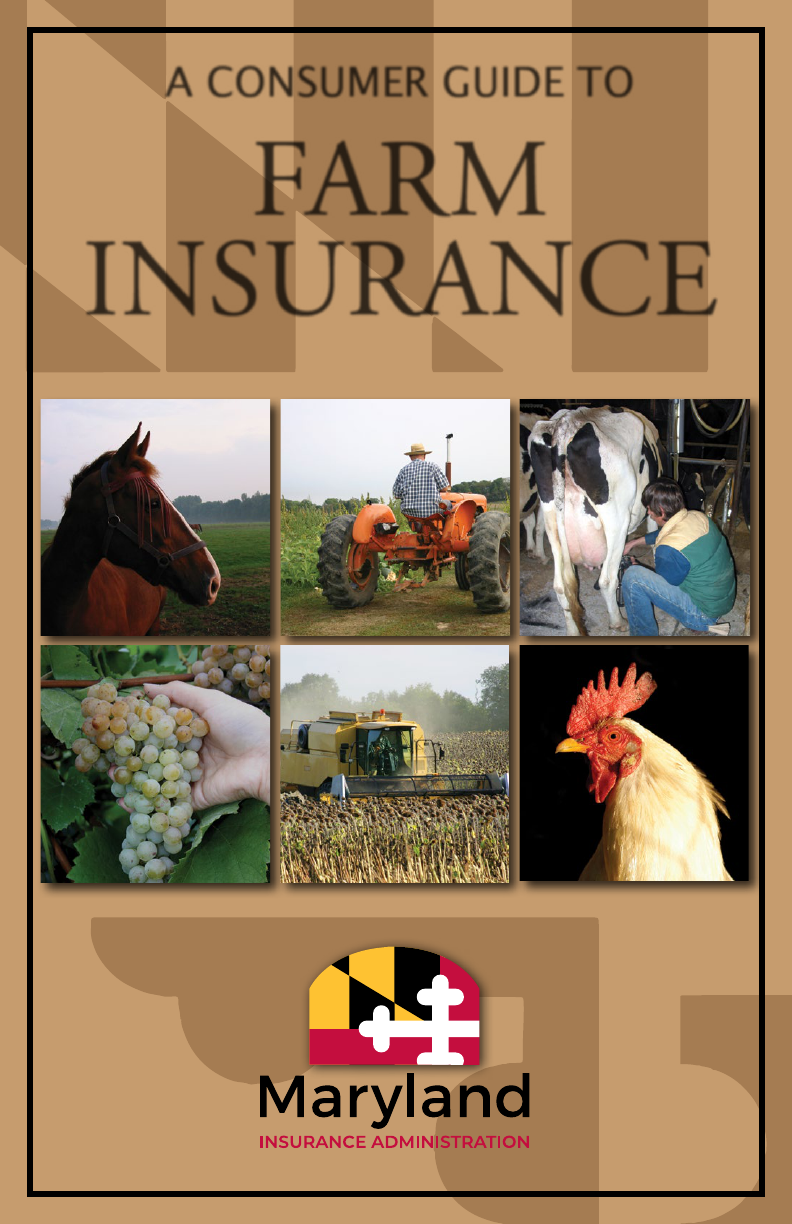
A CONSUMER GUIDE TO
FARM
INSURANCE

A CONSUMER GUIDE TO
FARM
INSURANCE
INSURANCE ADMINISTRATION

A CONSUMER GUIDE TO FARM INSURANCE
Maryland Insurance Administration • 800-492-6116 • www.insurance.maryland.gov
TABLE OF CONTENTS
Introduction ....................................................1
e Need for Farm Insurance .......................................1
Frequently Asked Questions About Farm Insurance ......................2
Shopping Smart: A Few Quick Tips .................................10
How to File A Complaint .........................................12

1
Maryland Insurance Administration • 800-492-6116 • www.insurance.maryland.gov
A CONSUMER GUIDE TO FARM INSURANCE
INTRODUCTION
e Maryland Insurance Administration (MIA) is an independent State agency that
regulates Maryland’s insurance marketplace and protects consumers by ensuring
that insurers and insurance producers (agents and brokers) act in accordance with
insurance laws. We produced this guide to help educate Maryland residents about
farm insurance.
e Insurance Administration is also responsible for investigating and resolving
complaints and questions concerning insurers that do business in Maryland.
THE NEED FOR
FARM INSURANCE
Based on its diverse economy, Maryland is often described as “America in
Miniature.” Our agricultural heritage is part of that diversity. One need only travel
from Western Maryland to the Lower Eastern Shore to recognize the importance of
farming in our state.
e statistics are amazing. According to the United States Department of
Agriculture, there are more than 12,000 farms in our state, which span nearly
2 million acres of land. e challenge for today’s farmers is to hold onto their land
and maintain a viable source of income for their families and their communities.
In an eort to stay competitive, more farm owners are expanding their operations
beyond the traditional crop harvesting to what is now called “agri-tourism.”
Hayrides, corn mazes, “pick-your-own” products and roadside stands are all
becoming common enterprises as farmers look for ways to generate more revenue
from their operations and educate others to the farm lifestyle. As farmers expand
their traditional operations to include new and dierent operations, they are met
with new liability issues and new insurance needs.

2
Maryland Insurance Administration • 800-492-6116 • www.insurance.maryland.gov
A CONSUMER GUIDE TO FARM INSURANCE
In an eort to help Maryland consumers meet these challenges, the Maryland
Insurance Administration oers this guide, which focuses entirely on insurance
issues relating to agricultural operations. is guide attempts to explain the basic
coverages included in farm policies, as well as the types of policies that are available
in the market. We also have included information that is designed to assist you
when shopping for a policy.
is publication is not intended to provide legal advice or opinions regarding
coverages you may need or any specic policy you may purchase. It is a good
idea to review your policies regularly to ensure they provide coverage for all
your operations.
FREQUENTLY
ASKED QUESTIONS
WHY SHOULD I INSURE MY FARM?
Your farm is probably the largest and most important investment you have made in
your lifetime. Insurance is to protect you in the event of a catastrophe or loss that
you could not aord. In the event of a loss, there could be damage to your home,
its contents, outbuildings, equipment, livestock, crops, etc. Few of us have sucient
personal resources to cover these types of losses. Insurance provides a means by
which we can transfer this risk of loss to an insurer who does have the nancial
resources to cover the costs.
In addition, insurance policies can provide you with protection if someone is
injured or hurt on your property or incurs property damage due to something
you did or failed to do. e same applies if a person is injured or his property is
damaged by something you own or by someone who works for you. You also may
be able to purchase insurance that will protect you if someone becomes ill or hurt
after eating or using a product they receive or purchase from you, such as fruits,
vegetables, pies or jams. Insurance policies also may protect you by providing you
with an attorney to represent you at no charge if you are sued by someone making a
claim that might be covered by your policy.

3
Maryland Insurance Administration • 800-492-6116 • www.insurance.maryland.gov
A CONSUMER GUIDE TO FARM INSURANCE
If you have a mortgage on your property, your lender will likely require that you
carry insurance and the mortgage holder will be named as an additional insured on
the policy.
WHAT TYPE OF INSURANCE SHOULD I PURCHASE?
e type of insurance you should purchase will depend on a number of dierent
factors, including:
• the type of farm you have;
• the type of business you operate (growing crops, livestock, agri-tourism);
• whether you have employees working on the farm;
• any outbuildings you may have; and
• the type of equipment you have.
In order to determine what the appropriate insurance coverage is, you should meet
with a producer and discuss the specics of your farm operation in depth to nd
the right coverage for you. It is important to remember that a farm policy diers
from a homeowners policy. You should make certain you have a clear understanding
of what is covered and what is excluded under your policy.
WHAT TYPE OF INSURANCE COVERAGES SHOULD
I PURCHASE?
Farm policies have many dierent types of coverages available. To be certain you
have the appropriate type and amount of coverage, it is essential for you to talk with
a producer.
e following are some of the standard coverages available under a farm policy:
• Property damage coverage, which protects your farmhouse and
outbuildings or household belongings if they are damaged or destroyed by
certain causes of loss. Some examples are: re, lightening, hail or tornado.
• Liability coverage, which will pay for damages if you unintentionally
cause injury to another person, or if you unintentionally cause another
person’s property to be damaged or destroyed.
• Medical payments coverage, which pays up to a specied amount for
medical expenses incurred by persons injured in an accident on your
property and, in certain situations, away from your farm, regardless of

4
Maryland Insurance Administration • 800-492-6116 • www.insurance.maryland.gov
A CONSUMER GUIDE TO FARM INSURANCE
whether you were at fault for that person’s injury. is coverage does not
apply to you or a member of your household.
• Additional living expenses coverage, which will pay for additional
expenses you incur when you cannot live in your dwelling because of
damage or loss that is covered by your policy. For example, if you are
required to move into a motel or apartment while your home is being
repaired, your insurer will pay the cost of this temporary housing.
In addition to these basic coverages, many companies oer a variety of additional
coverages for an additional cost. ese are generally referred to as endorsements
to your policy, but they may also be a separate policy, such as Tractor and Farm
Equipment insurance. Endorsements may be purchased to increase or expand some
of the basic coverage, such as changing from Actual Cash Value (ACV) coverage to
Replacement Cost Value (RCV) coverage, to provide coverage for specic types of
losses, for example, water that backs up from sewer and drains, or to cover items
excluded by your policy, such as particular animals, outbuildings, farm equipment.
Many of the items typically covered under a homeowners policy, such as fences,
outbuildings and swimming pools, will not be covered under your farm policy
unless you specically purchase an endorsement covering these items. e types of
coverage you elect to purchase will determine the price of your policy.
Tractor and Farm Equipment insurance, or agricultural machinery insurance,
protects owners of traditional farm machinery against damage to tractors or other
equipment from certain causes of loss. Tractor and Farm Equipment insurance
covers tractors, combines, farm oce equipment, and many other kinds of
equipment, supplies and tools. It can be purchased as a standalone plan or by an
endorsement to your Farm and Ranch owner’s insurance.
Tractor and Farm Equipment insurance often protects you against both liability and
property damage and covers a number of perils, commonly:
• Fire
• Lightning
• Windstorm
• Hail
• Smoke
• eft and vandalism
• Collision

5
Maryland Insurance Administration • 800-492-6116 • www.insurance.maryland.gov
A CONSUMER GUIDE TO FARM INSURANCE
You can usually add additional coverages, called endorsements, to your policy
for things like replacement cost (generally for equipment less than ten years old),
breakdown, protection for equipment you are renting or borrowing from others,
and perils that are specic to your location or situation.
Furthermore, if you have employees working on your farm, you may need to
purchase workers’ compensation coverage. To be certain you obtain proper coverage
and an accurate quote, you should have a list of all your employees, their titles and a
description of the work they perform, as well as the number of hours they work and
the wages they earn, with a summary reecting the total number of employees and
the total payroll.
IF I HAVE DECIDED T O ALLOW THE PUBLIC ONTO
MY FARM FOR AGRI-TOURISM LIKE HAYRIDES AND
PETTING ZOOS, DO I NEED TO PURCHASE ADDITIONAL
INSURANCE FOR THESE ACTIVITIES?
More and more farmers are turning to agri-tourism in order to generate additional
revenue from their farms. If you elect to expand your business to include these types
of operations, you need to make certain you have the appropriate type of insurance
and the appropriate amount of liability coverage to protect you in the event
someone becomes sick or injured while on your property.
If you operate businesses at your farm, including petting zoos, pick-your-owns,
corn mazes, haunted barns, pumpkin patches, farm stands or hayrides, you may
need a business policy as opposed to a farmowners policy. If you sell particular
products, such as jams, pies, fruits or vegetables, consider purchasing a policy to
provide you with product liability coverage. e best way to be certain you have the
proper insurance in place to protect you and your farm is to have a producer come
to your farm, walk around with you to inspect it and discuss in detail your farm
operations. is will enable the producer to provide you with the expertise
he is trained to deliver.
In preparation for your visit by a producer, you may want to consider assessing your
farm’s safety and security issues. What are the potential hazards? What can you do
to address those hazards? Is the hazard physical? For example, is there an uneven

6
Maryland Insurance Administration • 800-492-6116 • www.insurance.maryland.gov
A CONSUMER GUIDE TO FARM INSURANCE
path that could cause someone to trip, but that could be corrected with a simple
repair? Are there precautions, such as fencing and signage, in place to prevent
animal bites? Is the hazard a potential risk of bacterial infection and illness? Both
of these hazards require you to educate your customers so they are aware of their
personal responsibilities for their own safety. Discuss establishing a safety plan for
your operations with your producer. Also, remember it is important to conduct
periodic self-assessments and meet with your producer to discuss any changes in
your operations.
HOW MUCH WILL MY INSURANCE COST?
e cost of insurance will depend on a variety of factors. e primary factor is the
type of coverage you want to purchase. e price also will reect any prior claims
history and the amount of your deductible; the higher the deductible, the lower the
premium. Developing a farm safety and security plan for your farm and periodic
self-assessments may reduce your insurance premium. Ask your agent or broker
if they charge a fee for making a premium payment with a credit card. ey are
permitted to charge the actual expenses incurred when a premium payment is made
using a credit card, provided the amount of the fee is disclosed.
HOW DO I FIND AN INSURER TO INSURE MY FARM?
A list of insurers licensed to sell farm insurance in Maryland, Companies With
Approved Farm Policies in Maryland, is available from the MIA on its website at
www.insurance.maryland.gov. However, not every insurer oers the same type
of policy. You will need to contact the insurer or a licensed producer to learn
specically what type of risks they insure and what types of coverages they sell.
Some oer package policies to cover the dwelling and its contents, barns, stables,
and other structures in addition to liability coverage. ese policies may cover farm
business operations and liability arising out of the sale of farm products. Some
insurers also oer umbrella or excess liability policies. Quotes from these insurers
can be obtained through independent producers.

7
Maryland Insurance Administration • 800-492-6116 • www.insurance.maryland.gov
A CONSUMER GUIDE TO FARM INSURANCE
WHAT SHOULD I DO IF I HAVE A CLAIM?
If you are the victim of a theft, re or other type of accident or loss, you may have
the right to le an insurance claim. You should look at your specic policy to
determine if you can submit a claim, and what steps to follow.
Most policies tell you what you are required to do following a loss. Remember to
check your policy to nd out what you are required to do. ough each policy
diers, many policies require that you:
• Give immediate written notice of a possible claim to your producer or
insurer. e sooner you le your claim, the sooner you can expect a response.
• If the loss is a theft, you should notify the local police.
• Protect your property from further loss or damage. You may want to take
photographs of the damage. Also, if you make temporary repairs, keep
a record of what you do and save all of your receipts for repair-related
expenses. is may include buying plywood and nails to board up broken
windows.
• Give your producer, adjuster and/or insurer a list of all damaged, destroyed
or stolen property. Be sure to keep a copy of this list. In the case of theft,
be sure to give a copy to the police.
• Show the damaged property to your producer, adjuster and/or insurer
if asked. Do not dispose of any damaged property until your producer,
adjuster and/or insurer says you may do so.
You should keep in mind that most insurance policies set specic time limits for
ling a claim, and require cooperation with the insurance company’s investigators.
If you do not ll out your claim forms promptly, or if you fail to protect your
property from further damage and otherwise fail to cooperate with your insurer,
your claim may not be settled to your satisfaction and your coverage may be
jeopardized. erefore, it is important to respond promptly to each of your insurer’s
requests. If you have questions or concerns about the way your claim is handled,
you should contact your producer or insurer directly.

8
Maryland Insurance Administration • 800-492-6116 • www.insurance.maryland.gov
A CONSUMER GUIDE TO FARM INSURANCE
If you feel that the amount of money oered by your insurer to pay for the loss is
not fair or adequate, there are several alternative courses of action you may consider:
− you can demand an appraisal as per the terms of your insurance policy;
− you can le a complaint with the MIA; and/or
− you can hire a lawyer to advocate on your behalf and explain legal options.
AN INSURER SAYS THEY DO NOT WANT TO INSURE ME.
WHERE DO I TURN FOR INSURANCE?
If you have been turned down by one insurer for your farm insurance, try obtaining
coverage through another insurer. Do not assume that because one insurer turned
you down, all insurers will turn you down. Just as insurers have dierent rates they
charge, they also have dierent underwriting requirements. Call around and keep
trying to obtain an insurance policy.
CAN MY INSURER CANCEL OR NOT RENEW MY
POLICY IF I GAVE INACCURATE INFORMATION ON MY
APPLICATION?
Yes. An insurer may lawfully cancel or not renew your policy if you misrepresent
material information about yourself or the risk they are insuring, such as your
address, claims history, driving record, accident history or farm operations.
CAN MY INSURER CANCEL MY POLICY FOR LATE
PAYMENT?
Yes. Your insurer may cancel your policy for nonpayment of the premium, even if
the payment is only one day late. e insurer must provide you with a notice 10
days in advance that your policy will be cancelled. Some insurance companies have
guidelines for accepting late payment and may reinstate you when the payment has
been made. However, this is not a legal requirement. e best practice is to pay
your premiums by the due date in order to avoid being cancelled.

9
Maryland Insurance Administration • 800-492-6116 • www.insurance.maryland.gov
A CONSUMER GUIDE TO FARM INSURANCE
CROP INSURANCE
WHAT IS CROP INSURANCE?
e federal Risk Management Agency oers a federally subsidized crop insurance
program through private insurance companies. Crop insurance covers disasters such
as drought, hail, frost, hurricanes, excessive moisture, re, insects and plant disease,
and wildlife damage. For specic information on a particular crop, contact your
local crop insurance agent or visit www.rma.usda.gov.
WHERE CAN I LEARN MORE ABOUT CROP INSURANCE?
Maryland Cooperative Extension
University of Maryland
College of Agriculture & Natural Resources
http://extension.umd.edu
Check under “Locations” for the address and phone number of the location nearest you.
Risk Management Agency
U. S. Department of Agriculture
USDA/RMA/Stop 0801
Room 6092-South
1400 Independence Avenue, S.W.
Washington, DC 20250
Phone: 202-690-2803 | Fax: 202-690-2818
www.rma.usda.gov
Risk Management Agency - Regional Oce for Maryland
Eastern Regional Compliance Oce
4405 Bland Road, Suite 165
Raleigh, NC 27609
Phone: 919-875-4930 | Fax: 919-875-4928
www.rma.usda.gov
Maryland Department of Agriculture
50 Harry S. Truman Parkway
Annapolis, MD 21401
Phone: 410-841-5700 | Toll Free: 800-492-5590
www.mda.maryland.gov

10
Maryland Insurance Administration • 800-492-6116 • www.insurance.maryland.gov
A CONSUMER GUIDE TO FARM INSURANCE
WHERE CAN I PURCHASE CROP INSURANCE?
Companies designated by the United States Department of Agriculture (USDA)
provide crop insurance coverage through the Standard Reinsurance Agreement
(SRA) in Maryland. ere is a list of approved agents for Maryland online at
https://public.rma.usda.gov/AipListing/InsuranceProviders.
You also may search the USDA’s Risk Management Agency’s main
database of agents (Agent/Insurer Locator) for an agent authorized to sell
crop insurance. A complete list of crop insurance providers is available at
http://www.rma.usda.gov/tools/agent.html or contact the regional oce of the
RMA at 919-875-4880.
SHOPPING SMART:
A FEW QUICK TIPS
1. Comparison shop. Before you buy an insurance policy, obtain price quotes
from several companies and compare not only the price, but the coverages and
limits of the coverages and the applicable deductible you will receive if you purchase
the policy. is will enable you to make an apples-to-apples comparison and not
be swayed by price alone. You also may check the nancial strength and stability
of an insurer by referring to several organizations that provide nancial ratings.
ese publications are found at any public library. In addition, you may access the
information via their websites:
• A.M. Best www.ambest.com
• S&P Global Ratings www.spglobal.com/ratings
• Moody’s Investors Service www.moodys.com
• Fitch Ratings www.tchratings.com
• Demotech, Inc. www.demotech.com
2. Determine what coverages you want and need. You may need to purchase
various endorsements that could change or add coverages. Endorsements that add
coverage will result in a premium increase.

11
Maryland Insurance Administration • 800-492-6116 • www.insurance.maryland.gov
A CONSUMER GUIDE TO FARM INSURANCE
3. When you speak with producers to obtain quotes for your farm insurance,
you should answer questions truthfully. Wrong information may result in an
incorrect price quote, rejection of your insurance application, or cancellation of
your policy.
4. Consider higher deductibles. Your policy will have deductibles applicable to
claims and losses. A deductible is the amount you have to pay out of pocket on your
claim before the insurer pays. e higher your deductible, the lower your premium.
Remember that your claims history is considered for purposes of insuring you at the
start and for purposes of renewing your policy. us, if you will not make a claim
that involves less than a certain dollar amount, you should consider raising your
deductible to reect that amount and realize the savings on the premium you would
be charged with the higher deductible.
5. Ask about discounts. Insurers may oer policy discounts to lower your
premium. Ask your producer what discounts the insurer oers and which ones you
may be eligible to receive.
6. Make sure you have uninterrupted coverage. Never cancel an existing policy
until you have written conrmation that your new policy is in eect.
7. Do not pay cash. Pay for your insurance with a personal check or money order made
out to the insurer or producer. Be sure you obtain a receipt for your premium payment.
8. Remember. When shopping for insurance, your premium will be based on
several factors. e county in which the farm is located, level of re protection
available (i.e. the proximity of your farm and its buildings to a re department and
water source for re suppression), the type of policy you purchase, and the amount
of coverage you buy all help determine your premium.
9. If one insurer turns you down, don’t give up… keep shopping! Dierent
companies have dierent criteria for the types of farms they will insure.

12
Maryland Insurance Administration • 800-492-6116 • www.insurance.maryland.gov
A CONSUMER GUIDE TO FARM INSURANCE
10. Be sure your coverage ts your needs. Buy the proper types of coverages in
the amounts sucient to provide you with the nancial protection you need in the
event your property is damaged or destroyed or a claim is led against you. is
means keeping a realistic and aordable dollar amount of coverage on your farm.
11. Develop a farm safety and security plan for your farm. You should
implement the plan to make sure it will work in the event of an emergency, and
conduct periodic self-assessments to ensure that it remains practical.
HOW TO FILE
A COMPLAINT
e Maryland Insurance Administration’s primary role is to protect consumers
from illegal insurance practices by making certain that insurers and producers doing
business in Maryland act in accordance with state insurance laws. You may contact
the Insurance Administration to le a complaint against an insurer or producer who
you believe is not acting in accordance with Maryland law.
Maryland’s insurance laws not only govern insurers’ conduct -- they also protect
Maryland consumers. Insurers are prohibited from settling claims in an arbitrary
and capricious manner. is means that insurers’ claim settlement practices must
be fair, nondiscriminatory and adhere to Maryland insurance laws.
If you feel that your insurer has acted improperly, you have the right to take action
by ling a complaint with the Maryland Insurance Administration. However, some
disputes may be governed by your policy’s terms and may not be a problem the
Maryland Insurance Administration can resolve for you.
Complaints must be received in writing. Please provide as much detail as possible,
including copies of pertinent documents. A trained, professional investigator will
handle your complaint. e investigator will contact the insurer/producer to try to

13
Maryland Insurance Administration • 800-492-6116 • www.insurance.maryland.gov
A CONSUMER GUIDE TO FARM INSURANCE
resolve the issue. Meanwhile you will be advised of the steps being taken on your
behalf. Complaint les are not closed until the Maryland Insurance Administration
has made a determination regarding the complaint.
e MIA also established a Rapid Response Program designed to help certain
consumers resolve property and casualty claims (such as auto and homeowners
claims including those made under commercial lines policies) quickly and
without having to le a formal written complaint. For more information about
this program, please contact us at 410-468-2340 or 800-492-6116 ext. 2340.
Participation in the Rapid Response Program is voluntary and does not aect your
right to le a formal complaint.
For additional information or if you have a complaint, please contact the Maryland
Insurance Administration’s Consumer Complaint Investigation Division at
410-468-2000 or toll-free at 800-492-6116. Consumers may also le their
written complaint in person or by mail.
Consumers may also le a complaint by going online to the Maryland Insurance
Administration’s web site at www.insurance.maryland.gov and under Consumers,
click on File a Complaint.
Filing a Civil Action for a First Party Property & Casualty Claim
or an Individual Disability Claim
A Maryland consumer who has a property and casualty insurance policy (property
and casualty insurance includes automobile, homeowners, re and/or dwelling,
inland marine, commercial liability policies) or an individual disability policy (a
policy that provides for lost income, revenue, or proceeds in the event that an
illness, accident, or injury results in a disability that impairs an insured’s ability
to work or otherwise generate income, revenue, or proceeds that the insurance
is intendeds to replace) that was issued, sold or delivered in Maryland and
believes that his/her property and casualty insurer or his/her individual disability
insurer failed to act in good faith in making a decision regarding his her rstparty
insurance claim may seek special damages against the insurer by ling a

14
Maryland Insurance Administration • 800-492-6116 • www.insurance.maryland.gov
A CONSUMER GUIDE TO FARM INSURANCE
civil complaint, in addition to or in place of ling an administrative consumer
complaint with the Maryland Insurance Administration (MIA).
e Insurance Article denes “good faith” as making an informed judgment based
on honesty and diligence supported by evidence the insurer knew or should have
known at the time the insurer made a decision on the claim. If the Maryland
consumer les a civil complaint and the insurer is found to have failed to act in
good faith, the insured may be entitled to an award with “enhanced damages.”
Such enhanced damages may include, in addition to the actual contract damages,
litigation expenses, including reasonable attorneys’ fees not to exceed one third of
the actual damages payable to the insured, and interest at the post-judgment rate.
An explanation of when a consumer can seek these special damages, when a
lawsuit has to be led with the MIA, and how to make that ling are explained
in a separate MIA publication: “A Guide for Consumers Filing a 27-1001 Civil
Complaint.”

MIA-FI-1 (1/22)
is consumer guide should be used for educational purposes only. It is
not intended to provide legal advice or opinions regarding coverage under a
specic policy or contract; nor should it be construed as an endorsement of any
product, service, person, or organization mentioned in this guide.
is publication has been produced by the Maryland Insurance Administration
(MIA) to provide consumers with general information about insurance related
issues and/or state programs and services. is publication may contain
copyrighted material that was used with permission of the copyright
owner. Publication herein does not authorize any use or appropriation of
such copyrighted material without consent of the owner.
All publications issued by the MIA are available free of charge on the MIA’s
website or by request. e publication may be reproduced in its entirety
without further permission of the MIA provided the text and format are not
altered or amended in any way, and no fee is assessed for the publication or
duplication thereof. e MIA’s name and contact information must remain
clearly visible, and no other name, including that of the company or agent
reproducing the publication, may appear anywhere in the reproduction. Partial
reproductions are not permitted without the prior written consent of the MIA.
People with disabilities may request this document in an
alternative format. Requests should be submitted in writing to
the Chief, Communications and Public Engagement at the
address listed below.
200 St. Paul Place, Suite 2700
Baltimore, MD 21202
410-468-2000
800-492-6116
800-735-2258 TTY
www.insurance.maryland.gov
www.facebook.com/MdInsuranceAdmin
www.twitter.com/MD_Insurance
www.instagram.com/marylandinsuranceadmin
INSURANCE ADMINISTRATION
